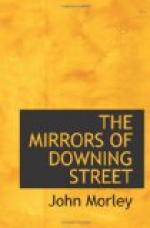The nation would have been in a healthier condition if Lord Haldane’s reasoned policy had been acted upon and Mr. Lloyd George’s talent for oratory had been employed to explain that reasoned policy to the less educated sections of the public, instead of used to arouse an angry opposition to the unreasoned and disconnected reforms of his own conception.
But what a topsy-turvy world! Mr. Lloyd George is “the man who won the war,” he who did nothing to prepare for it, and suggested some things that might have made it difficult to be won; while Lord Haldane, who did prepare for it, and whose work did save the whole world, is cast out of office. And when the war is won, and Lord Haldane’s position has been publicly and nobly vindicated by Lord Haig, Mr. Lloyd George as Prime Minister of England has a portfolio for Mr. Austen Chamberlain and another for Dr. Macnamara, but none for this man to whom more than to any other politician he owes his place and perhaps his life.
Lord Haldane is not what Prodicus used to call “a Boundary Stone, half philosopher and half practical statesman.” His philosophy is his statesmanship, and his statesmanship is his philosophy. He has brought to the study of human life a profound mind and a trained vision. His search after truth has destroyed in him all pettiness of personal ambition. He desires, because he regards it as the highest kind of life, to further the work of creative evolution, to be always on the side of spiritual forces, and never to be deceived by transitory materialism. Democracy has need of these qualities, and a great empire without such qualities in its statesmen can hardly endure the test of time.
His faults are a too generous confidence in the good sense of democracy and a lack of impassioned energy. He is too much a thinker, too little a warrior. Unhappily he is not an effective speaker, and his writing is not always as clear as his ideas. He is at his best in conversation with men whom he likes.




